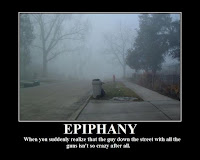 In March of 1981, Jodie Foster and President Reagan had three things in common John Hinckley Jr., mental illness and a gun. It was clear in one place that the relationship would need to be tied together in a dramatic way. In that place there was an undeniable need to protect a commitment to one by taking the life of another. In that place a shadow of an idea became an irresistible voice. The voice was not about the need to act but the duty to act. The place was the mind of John Hinckley. Where the voice became the plan and the plan became the gun. The motivator and equalizer in the mind of Hinckley was not the gun. In that moment it was his mental illness.
In March of 1981, Jodie Foster and President Reagan had three things in common John Hinckley Jr., mental illness and a gun. It was clear in one place that the relationship would need to be tied together in a dramatic way. In that place there was an undeniable need to protect a commitment to one by taking the life of another. In that place a shadow of an idea became an irresistible voice. The voice was not about the need to act but the duty to act. The place was the mind of John Hinckley. Where the voice became the plan and the plan became the gun. The motivator and equalizer in the mind of Hinckley was not the gun. In that moment it was his mental illness.Despite the best efforts of the world’s best day-to-day Presidential protective agency, the Secret Service, Hinckley’s mental illness won out. The contest was not all that close. That is the thing about mental illness: it does not need plan to be dangerous. In the nearly successful assassination of President Reagan the plan was very complex–walk up to him and shoot. There was no plan to secret himself, no plan to escape, no plan to discard the gun, no plan at all except the duty to act. Consequences are never to be feared in the mind of the mentally ill because they are never part of the plan.
In January of 2011, Senator Gabrielle Giffords and a nine year old who was the future of this country had three things in common, Jared Loughner, mental illness and a gun. And thirty years later the debate about the mentally ill and guns has gone nowhere with any meaningful result. It must be that when it comes to gun possession the cost of freedom is defined by how many times we can fail the mentally unstable. How many times will we pretend the expressed sorrows of a nation pass for meaningful public safety policy discourse.
The circumstances surrounding the shooting in Tucson, Arizona that broke the silence of the New Year again beg us to address the mental illness on the streets of this country in an entirely different way. The loss of those killed and injured should shake us into realizing that getting bogged down in an argument blaming guns for the consequences will get us no where. We must act decisively to get guns out of the hands of the mentally unstable before they self identify as the shooter did in Arizona.
We need to start from a different place than the evil of guns and the instant individual responsibilities of the mentally unstable. Arguing over guilt and guns gets us no where. We need to get real about getting guns out of the hands of the mentally ill. Getting real means reframing the Second Amendment debate. It means putting our fears aside in the interest of a safer America without unduly depriving us of our Second Amendment rights. I mean both the fear that any gun especially any hand gun out there is bad and that any restrictions on access to a hand gun is a plot to disarm the citizenry.
 Stop the argument at the extremes and narrow it to protecting the unsuspecting when guns and mental illness come together to kill. Guns don’t kill people but guns we legally placed in the hands of those we know or as the law often says “should know” are a likely danger to others in the uncontrolled environment of the streets.
Stop the argument at the extremes and narrow it to protecting the unsuspecting when guns and mental illness come together to kill. Guns don’t kill people but guns we legally placed in the hands of those we know or as the law often says “should know” are a likely danger to others in the uncontrolled environment of the streets.When high profile gunfire has been involved we are yet to properly honor the deaths and injuries suffered by victims and their families. Time after time we fail to use the tragedy of the moment to substantively reduce the access to guns by the mentally unstable.
And there is nothing too general about the term mentally unstable in this context. There are few incidents like the shootings in Arizona that is not proceeded by the shooters actions and statements that clearly warn of the potential for the big trouble that often follows.
Protecting our nationally prominent elected officials is only a small part of the story. Unfortunately it takes a tragedy of congressional and presidential proportion to give us yet another chance to begin to get this issue right. But so far again we race to the extreme. It does not help when congressional members carrying guns upstage the real issue here. As if that hype does anything other than to distract us from the task at hand.
Guns, including handguns, get into lives, homes and onto the streets in four clearly different ways.
- Sold by Federally License Firearms Dealers;
- Sold and traded between private parties including through large venues like gun shows;
- Stolen and make their way to the directly street as a result of these crimes or
- Originally stolen in one crime are sold, traded or use commit other crimes.
While this is really a national discussion let’s take it to the streets of Oregon. As of today someone who is mentally ill–even diagnosed (I didn’t say committed)–can get a gun in Oregon through any one of these avenues. So where do we do we start to limit the access to guns by those uncommitted or yet to be committed mentally ill? Certainly by not allowing the scope of the issue to paralyze us from implementing real legislative change that will have measurable results.
We start with creating “No Buy Lists” required to be held by federally licensed dealers. Right now the bar is too low for purchasing a firearm. The threshold is the display of seriously unbalanced behavior tinged with violent rhetoric that gets worse overtime. Because they have may not been the subject of a formal mental health process including court commitment, they are free to purchase whatever gun and whatever high capacity ammunition magazine are lawfully available.
That includes from federally licensed dealers. Yet these dealers in Oregon have the instant ability to check a person’s background which may be used to deny the purchase of a gun. We have the facts at hand that when it comes to the dangerously mentally unstable we need to take the next step.
The problem is that we have been too timid about keeping guns out of the hands of the mentally unstable often at our own peril. We need to create legally sufficient criteria by which a judge can decide that a person, regardless of a prior formal mental commitment or long term mental health treatment, should not be allowed to buy a gun. We must define a petition process by which law enforcement, family members or mental health professionals without violating privacy protections are able to petition the court for such a prohibition.
Once a court has determined that the criteria has been meet and issues the court order that name becomes part of a No Buy list until a court orders it removed. This anticipates the right of the person to have a hearing prior to the order being instated. Also the legislation needs to define an appeals process as a remedy to the immediate decision and later to demonstrate to the court that the name should be removed from the No Buy List.
The court process is key to ensuring that the Second Amendment rights of any individual is not put at risk by being falsely labeled as too unstable to buy a gun. It is also key to give law enforcement a direct method of connecting displayed and persistent unstable behavior, the potential danger they present and the ability to limit their ability to get a gun.
The criteria developed for the court to consider should demonstrate that there is greater potential risk by allowing the purchase of a firearm than is their right to purchase one. It cannot be so restrictive so that the threshold for making the No Buy List is equal to a civil mental commitment. That standard would discourage law enforcement from even trying.
As a nation we have decided that certain persons may present too great risk to board an airplane and so we have created No Fly lists. I clearly recognize the difference between the the availability of an airline seat and the right to own a firearm. However the question is less about the right to own a firearm than the right to purchase a gun the first place. After all we would never argue that the undiagnosed,untreated or uncommitted mentally unstable person should be able to buy a gun through a licensed process.
We should also recognize that this in no way puts the firearms out of reach of the mentally unstable. From the list of access points above obviously there are lots of guns out there. We have to start a meaningful discussion and move in a positive direction now, right now. To imagine we can take it all on at once is foolhardy and gets us nowhere. To not take it on at all threatens all of us but especially the mentally ill, their families and their victims. But lets not forget that at some point this issue threatens our Second Amendment rights when it again explodes.
Raising the public policy consciousness of our lawmakers is of value in and of itself. Protecting the rights of gun owners is served when we begin to protect our mentally ill from themselves by starting here with gun purchase from federally licensed dealers. Finally, we need to find an entry point to fight the good fight of remaking the disgrace of a mental health system we have in this state at least. The cops need our help to keep the mentally unstable out of jail and out of deadly trouble. We need to help them by giving them a practical tool they can use to make us safer.
Yes, the price of freedom is high. We now must decide what value we place on our freedom and how high a price we willing to pay for our freedoms and why. Because if we wait I guarantee you more guns in the hands of the mentally unstable will find us a nation in sorrow once again.
Bernie Giusto is former Multnomah County Sheriff, former Gresham Police Chief, and a former Oregon State Police Trooper
Bernie Giusto is former Multnomah County Sheriff, former Gresham Police Chief, and a former Oregon State Police Trooper
Tell ’em where you saw it. Http://www.victoriataft.com




